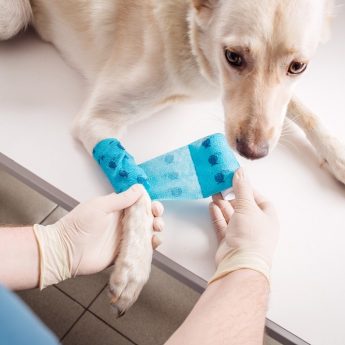A variety of threats confront our dogs on a daily basis. Bacteria, viruses, fungi, and parasites seemingly lurk around every corner, waiting to sicken our beloved pups.
Fortunately, most dogs have pretty robust immune systems, which thwack back these threats with ease. But in some cases, a dog’s immune system can actually cause him to become sick.
We call these types of problems autoimmune diseases, and they can be some of the most frustrating and challenging ailments that dogs face.
We’ll talk more about autoimmune diseases below. We’ll explain some of the most common examples, detail some of the symptoms they often cause, and discuss what treatment options are available.
What Causes Autoimmune Diseases in Dogs?
There are many different autoimmune diseases that afflict dogs (as well as cats, people, and other animals – dogs don’t have a monopoly on these problems). And while each one manifests in slightly different ways, they all involve the same fundamental problem.
But before delving deeper into autoimmune diseases, let’s take a step back and talk about how the immune system functions when everything works properly.
The Basics of a Healthy Immune System
Simply put, a healthy immune system works by recognizing foreign bodies and then taking them out ninja-style.
Often, the immune system is able to do so before the invader can cause illness, although viruses and other pathogens do sometimes get the upper hand. In such cases, your dog may feel rotten for a few days before the immune system is able to mount a sufficient counterattack and neutralize the invaders.
Obviously, immune systems aren’t perfect, or we’d never have to worry about our dogs getting sick. But, for the most part, they’re pretty darn effective.

Out-of-Control Immune Systems
The immune systems of dogs suffering from autoimmune diseases try to work in the same way. They seek out invaders and break out their molecular nunchucks.
The problem is, autoimmune diseases often cause a dog’s immune system to make mistakes.
They may still recognize and eliminate invading pathogens, but they also tend to mistake normal, healthy cells in the dog’s body for threats. This means that your dog’s body starts to effectively attack itself. This leads to a variety of different problems, depending on the specific type of autoimmune disease your dog is suffering from.
Why Do Some Dogs Suffer from Autoimmune Diseases?
Although genetics play a role in some autoimmune diseases, the causes of others remain poorly understood.
To complicate matters further, dogs are susceptible to a variety of different autoimmune diseases, which each progress in a different fashion and cause different symptoms – not all autoimmune diseases are the same. Some seemingly target specific body tissues, such as the skin or liver, while others are systemic, meaning they affect multiple body systems.
Accordingly, different autoimmune diseases likely have different causes.
Researchers are working hard to find the answers to these questions, as well as treatments for some of the more common forms. In fact, because some autoimmune diseases in dogs also affect people, some of this research may even have implications for human medicine.
For example, researchers Nicola J. Mason, BVetMed, Ph.D., and Aimee S. Payne, MD, Ph.D. have recently received a National Institute of Health (NIH) grant to investigate a potential treatment for an autoimmune skin disease called pemphigus – a disease that affects people and pups.
What Are Some of the Most Common Autoimmune Diseases in Dogs?
Vets have identified a variety of autoimmune disorders in dogs. We’ll discuss a few of the most common examples below.
Discoid Lupus Erythematosus
Discoid lupus erythematosus (DLE) is a disease that also goes by the name “collie nose,” although it is certainly not restricted to collies. In fact, we know that German shepherds, Shetland sheepdogs, and huskies can also suffer from the condition.
The primary symptom of the disease is a change in the color and texture of the skin around the nose, lips, eyes, ears, and genitals. According to VCA Animal Hospitals, the skin typically loses its pigment and becomes very smooth, rather than having a “cobblestone-like” texture.
No one is certain what causes DLE, although sun exposure appears to be a potential trigger. Some vets suspect that it is actually a relatively mild form of systemic lupus erythematosus. DLE can cause skin ulcers to form, but many dogs don’t seem to be especially troubled by the condition.
Systemic Lupus Erythematosus
Systemic lupus erythematosus is sometimes considered a “classic” systemic autoimmune disease that affects multiple body systems.
Often called lupus for short, the disease is often very difficult to diagnose, as it mimics an array of other diseases. Often, vets must painstakingly rule out a variety of other potential health problems before they feel comfortable diagnosing it.
Lupus can cause a variety symptoms, ranging from fevers to joint stiffness to skin problems. It can also cause problems for a dog’s blood. For example, a dog’s platelet or white blood cell numbers may fall precipitously in response to the condition.
Note that most vets recommend that owners avoid vaccinating dogs who have SLE.
Autoimmune-Mediated Hemolytic Anemia
Autoimmune-mediated hemolytic anemia (AIHA) – also called immune-mediated haemolytic anemia (IMHA) — is a disease in which a dog’s immune system attacks his red blood cells, causing anemia. If this sounds pretty serious, that’s because it is.
Your dog’s red blood cells are responsible for ferrying oxygen around inside your dog’s body. Without enough red blood cells, your dog’s body tissue will become starved of oxygen.
This can put your dog’s life in immediate jeopardy, so prompt veterinary attention — which will likely include blood transfusions — is imperative.
AIHA occurs in two forms: primary and secondary. The primary form seemingly occurs on its own. Unfortunately, nobody knows what causes primary AIHA to occur. Secondary AIHA, on the other hand, results from any of a number of health problems, ranging from cancer to parasites.
Some breeds appear to be more susceptible to AIHA than others. This includes:
- Cocker spaniels
- Dachshunds
- Springer spaniels
- Bichon frises
- Irish setters
The symptoms of AIHA are pretty diverse, but a reduced energy level, increase in water consumption, and a decrease in your dog’s appetite are all common signs.
Immune-Mediated Thrombocytopenia
Thrombocytopenia is a fifty-cent word that simply means that your dog’s blood doesn’t contain enough platelets. Platelets are specialized blood cells that help blood to clot following an injury, so it’s easy to see why this can be a very dangerous condition.
A few different things can cause thrombocytopenia, but dogs with immune-mediated thrombocytopenia (IMTP) suffer from the condition because their immune system attacks the platelets in their blood. This often leads to extensive bruising or abnormal bleeding. It can also cause anemia, which – if left untreated – can be fatal.
Like AIHA/IMHA, IMTP can occur in primary and secondary forms. The primary form is probably a hereditary disorder, but nobody understands exactly what causes it. It is most common in Labs, cocker spaniels, and miniature poodles, but dogs of any breed can probably suffer from it.
Secondary IMTP may arise in response to several health problems, including cancer, inflammatory diseases, and tick-borne illnesses.
Some of the most common symptoms of IMTP include lethargy, weakness, pale gums, and oral bleeding. With treatment, most dogs suffering from IMTP can live long, healthy lives.
Unfortunately, IMTP and IMHA/AIHA sometimes occur simultaneously. When this occurs, veterinarians referred to the condition as Evan’s Syndrome.
Inflammatory Bowel Disease
Inflammatory bowel disease (IBD) is a disease (or collection of diseases) that results in the inflammation of the intestinal tract. The most common symptoms include chronic vomiting and blood-laden diarrhea, but fever, lethargy, and loss of appetite are also commonly associated with the condition.
IBD should not be confused with irritable bowel syndrome (IBS). While much still remains to be learned about each condition, IBD is characterized by chronic intestinal inflammation, while IBS doesn’t usually cause the same type of physical changes to the intestinal tract.
There are a variety of causes for IBD in dogs, and it seems to have a hereditary component in some canines – particularly German shepherds and boxers, among others.
Given the diverse array of things that are thought to cause the condition, it is often necessary to attempt several different treatment strategies before achieving success. However, dietary changes are almost always recommended.
Immune-Mediated Polyarthritis
Arthritis (or, osteoarthritis, as it is sometimes called) is a painful and mobility-limiting condition that affects many dogs. Essentially, it causes the tissues within a dog’s joints to become painful and inflamed.
Arthritis is often caused by overuse. For example, dogs who are forced to repeatedly jump into and out of an elevated car may eventually suffer from the condition. It may also occur in dogs who are extremely active or participate in athletic activities.
However, arthritis can also be the result of an immune system disorder which results in the body attacking joint tissues. In such cases, it is often called immune-mediated polyarthritis or IMPA (the “poly” just means it can occur in multiple joints).
Immune-mediated polyarthritis typically causes symptoms like lameness, stiffness, joint pain, and abnormal gait, but it can also cause systemic problems, such as anorexia, fever, or weight loss. It often happens symmetrically, meaning that it will affect your dog’s right and left sides relatively equally.
There are a variety of things that can cause IMPA. Some breeds – including, most notably, Akitas and Shar-Peis – appear to be genetically predisposed to the ailment. Other dogs may develop the problem in response to some medications.
However, many cases of IMPA are idiopathic – meaning that no cause is ever conclusively established.
Bullous Pemphigoid
Bullous pemphigoid is a condition in which a dog’s immune system attacks the skin or mucous linings of the body.
It isn’t clear what causes a dog’s body to start producing antibodies that attack these tissues, but sunlight exposure may be a contributing factor.
Bullous pemphigoid causes pus- or fluid-filled blisters, which may erupt, leaving raw, open sores. These can occur on a dog’s head, neck, abdomen, groin, or feet, as well as the inside of the nose or mouth. The condition is likely very painful and uncomfortable for dogs, and it can be quite serious. Left untreated, bullous pemphigoid can prove fatal.
Some breeds, including collies, Shetland sheepdogs, and Dobermans, seem to be more susceptible to the disease than others.
The disease can usually be treated, but it often requires a multifaceted approach to dampen the immune system response and treat any secondary bacterial infections associated with the ulcers.
Pemphigus
Pemphigus – or, as it is often called, pemphigus complex – is a collection of five different, but related, autoimmune diseases that cause blisters to form. Despite the similarity of the names, pemphigus is a completely different condition than bullous pemphigoid.
In most cases, pemphigus causes blisters to form where mucosal tissues come into contact with skin, such as the eyelids, anus, lips, and nostrils.
The five forms of pemphigus include:
- Pemphigus Foliaceus (PF)
- Pemphigus vulgaris (PV)
- Pemphigus erythematosus (PE)
- Panepidermal pustular pemphigus (PPP)
- Paraneoplastic pemphigus (PNP)
You’ll need your vet’s assistance to distinguish between the five forms and recommend an appropriate treatment strategy.
What Are the Symptoms of Autoimmune Disease in Dogs?
Because there are so many different autoimmune diseases that afflict dogs, it’s hard to summarize the symptoms considered to be “normal.”
Nevertheless, we’ve assembled a list of some of the most common signs and symptoms that may indicate that your dog’s immune system is causing illness:
- Chronic vomiting or diarrhea
- Loss of appetite
- Changes in drinking behavior
- Unexplained skin ailments
- Lethargy
- Fever
- Blisters or rashes
- Weight loss
- Limping or stiffness
- Pale gums
Note that these symptoms can also indicate other illnesses, which highlights the importance of seeking veterinary assistance whenever you believe your pet may be sick.
How Do Vets Diagnose Autoimmune Diseases in Dogs?
If you suspect your dog has an autoimmune disease (or any other ailment, for that matter), you’ll want to take him into the vet for an evaluation.
Your vet will likely begin by taking a detailed history and then performing a physical examination. But from this point, your vet’s next steps will depend on the type of symptoms your dog is exhibiting.

There is no one-size-fits-all test to determine if a dog has an autoimmune disease. In fact, there aren’t very many tests that can determine if your dog has an autoimmune disease at all. Instead, vets usually diagnose autoimmune diseases via a two-pronged strategy.
To begin, your vet will likely try to rule out every common disease that may be causing your dog’s symptoms. For example, if your dog presents with chronic vomiting and diarrhea, your vet won’t try to establish that he’s suffering from IBD. Instead, he or she will begin ruling out parasites, bacterial infections, intestinal tumors, and all of the other common causes of these symptoms.
Then, once non-autoimmune diseases have been ruled out, your vet may simply try to treat the symptoms as though they’re being caused by an autoimmune disease. In many cases, this will eliminate or reduce the severity of your dog’s symptoms, which essentially confirms the diagnosis.
Can Autoimmune Diseases in Dogs Be Cured?
Most autoimmune diseases can be treated by modifying or dampening the immune system of your dog’s body.
For example, some steroids are helpful in tamping down the immune response, and this often helps eliminate the symptoms associated with many autoimmune diseases.
But while most autoimmune diseases can be treated, true cures remain elusive. Prolonged – even perpetual – treatment is often required to prevent the symptoms from returning.
However, doctors have begun experimenting with a few novel treatment strategies in human patients. At least two of these strategies may eliminate autoimmune disease entirely.
Because the autoimmune diseases that afflict dogs are fundamentally similar in many ways to those that affect humans, these treatment strategies may eventually allow vets to cure autoimmune diseases in dogs too.
One such approach works somewhat similarly to vaccinations. The doctors identify the protein or antigen that is triggering the immune response. They then start exposing the patient to a miniscule amount of the offending trigger.
Over time, the body sometimes begins to recognize that the targeted protein or antigen is not dangerous. This stops the immune response from occurring and eliminates the troubling symptoms.
Another approach that has also generated positive results revolves around the patient’s gut flora.
According to recent findings, a bacterium called Enterococcus gallinarum is often found in the organs of people with autoimmune diseases. This bacterium normally lives inside the intestines, where it is largely benign. But when it migrates out of the digestive tract, it starts triggering the immune system, which leads to the symptoms associated with autoimmune disease.
This bacterium should prove relatively easy to kill, which may hopefully lead to a cure (or at least another effective treatment) for autoimmune diseases.
***
Autoimmune diseases can be very hard on your pet, but most can be treated to ensure your dog still enjoys a high quality of life. Just be sure to visit your vet quickly if you suspect that he is suffering from such a disease and work closely with him or her to devise an effective treatment strategy.
Has your pup ever battled an autoimmune disease? Tell us about your experiences. Let us know what specific autoimmune disease your dog suffered from and the type of treatment your vet recommended.









No Comments